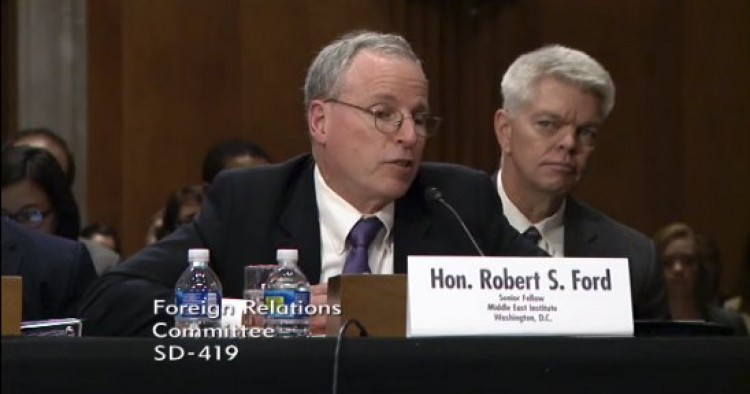The following testimony was delivered before the Senate Foreign Relations Committee on May 17, 2016. Find more information about the hearing, including video, here.
Mr. Chairman, Ranking Member Senator Cardin, other distinguished members of the Committee, thank you for the invitation to speak before the committee today about what new steps can be taken to mitigate the crisis in Syria. It is an honor to appear before you again.
There is not much we the United States can do now to mitigate the crisis in Syria quickly. The fighting is too entrenched and bitterly sectarian; both the Syrian government and the armed opposition seek military victory instead of preparing their own ranks for tough, mutual compromises. Foreign nations are deeply involved – far more deeply than the United States – and they are committed to winning the conflict militarily. There is no magic American bullet.
This is not to say there are not useful things the United States can and should do, but we are well past the point of a clearly identifiable path out of the conflict.
Today in Vienna there was another meeting of the International Syria Support Group and renewed calls for a cessation of hostilities. Last January and February I was highly skeptical that efforts to broker a cessation of fighting would achieve much. In fact, the February 27 agreement brought a significant reduction in violence for some weeks – longer than many observers, myself included, thought possible.
But it did break down, badly. Aleppo, the Damascus suburbs, Lattakia province, Idlib province, Homs province, and Hama province all are witness to that. The structural problem undermining an enduring cessation is the lack of agreed mechanisms to monitor violations and impose penalties on those determined responsible for violations. Indeed, it is not clear that American officials have a very clear understanding of which groups are operating in specific locations as they shift regularly in the course of the fighting.
I will add here that without greater military pressure on the Syrian government, it will not negotiate a compromise political settlement. The difference in tone between President Assad's public remarks of late last July, when he was sober about defeats, and his upbeat tone in public remarks this spring after the Russian intervention are striking. The Russian intervention thus hindered prospects of a negotiated deal. The United States, meanwhile, lacks leverage with the armed opposition because it – and its regional backers – view us as inconsistent at best. I don't know if our policy on the armed opposition in the remaining time of the Obama administration will change. I only know the result the policy has had on the ground.
There are steps the administration might be convinced to take now to mitigate some parts of the Syrian tragedy. They would help us from the national security standpoint, especially in terms of undermining extremist recruiting in Syria, and they would address the horrible humanitarian situation.
These steps include:
- Taking in more Syrian refugees. The screening process is thorough but labor intensive. It needs greater resources. So far, the United States has admitted only about 1,800 this fiscal year when the administration's goal is 10,000 by the end of September. As fantastic as it sounds, we should be aiming to take 100,000, but without far more resources this will not be possible.
- Pressing regional states such as Turkey and Jordan to keep borders open to refugees, as international humanitarian law requires. Both countries of course do much to help Syrian refugees, but there are reportedly 50,000 people trapped on the Syrian-Jordanian border now in the harsh conditions of early summer. Turkish border guards have shot at refugees attempting to cross into Turkey on occasion. We should urge such actions to stop.
Likewise there are modest steps we could do to better press for access by humanitarian aid providers to civilians in communities under siege by both government and opposition in Syria. These steps include:
- Raising specific instances of aid access denial, whether by the Syrian government or opposition fighters, in the Security Council with a view to discussing the possibility of Chapter VII action. The Russians have voted for UN resolutions such as 2254 that call for humanitarian access, and when the Syrian government blocks aid convoys, as it did in Daraya last week, the Russians should not be given a pass.
- Pressing Russia and Iran, and through them the Syrian government, to allow air drops to besieged communities in suburban Damascus just as there have been UN air drops to Deir Zour, an eastern Syrian city controlled by the Syrian Government and besieged by Islamic State forces.
- Pressing the UN and the International Committee of the Red Cross to be explicit, publicly, about which groups are responsible for blocking aid convoys. Only when combatants sense they will suffer retaliation of some sort will they change their behaviors. The absence of agreed monitors that I mentioned before makes the role of the UN and ICRC all the more important. In the past, they have preferred discretion, but clearly that discretion is paying marginal returns at best. The more forthright comments from Jan Egeland of the UN last week after the convoy to Daraya was stopped was a good step in this direction.
Looking longer term, Syria’s unity may be impossible to restore. If there is a durable cessation of hostilities but no progress on a compromise political deal, Syria could end up de facto partitioned even if no Syrian of any political stripe is now demanding this.
Partition is not a particularly good outcome for the United States. In such a scenario it is doubtful that large numbers of fighters from either the government or the Syrian opposition would reach across lines and cooperate against the Islamic State. It will thus make our efforts against ISIS harder.
Reconstruction of Syria will certainly be far harder and that in turn means that while refugee flows might subside, relatively few of the 4.8 million outside the country will be able to go home.
Polling of young people in the region suggests that unemployment is a big driver in extremist recruitment which again suggests that moribund reconstruction will pose a national security problem for us and our allies.
There are Syrian efforts to reach across bitter ethnic and religious divides and they merit our support. They are modest in size and won't fix Syria's crisis quickly, but they may lay groundwork that formal negotiations might utilize later.
Steps to support these efforts include:
- Encouraging more off-line, informal meetings between Syrians in track two formats and direct discussions under the auspices of international NGOs or senior world statesmen. It would be especially useful to encourage conversations between Syrian women from opposing camps, although it may be hard to find empowered women from among the ranks of government supporters.
- Encouraging greater participation from ethnic and religious minorities in off-line discussions with opposition and pro-government persons. And,
- Supporting efforts to build stronger civil society organizations in Syria so that they are better positioned when or if the day fighting ends ever comes. The White Helmets, for example, have done great work even if some members of that group are far from perfect. There are legal groups struggling to maintain elements of fair rule of law in areas outside government control that need support and health and organizations operating under horrendous circumstances struggling to keep the health care sector afloat. They need recognition and support.
The Middle East Institute (MEI) is an independent, non-partisan, non-for-profit, educational organization. It does not engage in advocacy and its scholars’ opinions are their own. MEI welcomes financial donations, but retains sole editorial control over its work and its publications reflect only the authors’ views. For a listing of MEI donors, please click here.












